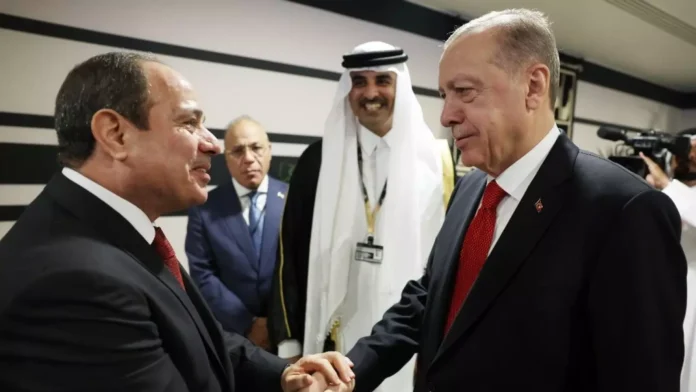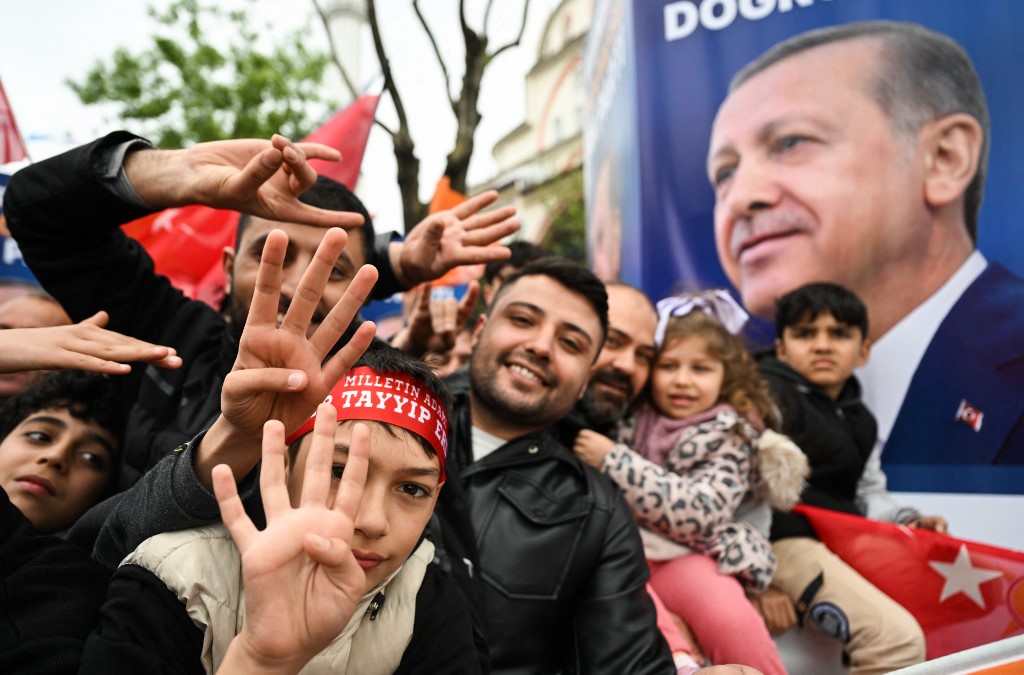A watershed moment is underway as President Erdogan is set to visit Cairo, in a trip overshadowed by the war on Gaza
After nearly a decade of strained relations with Egypt, Turkish President Recep Tayyip Erdogan is due to visit Cairo on Wednesday at the invitation of President Abdel Fattah el-Sisi.
Both leaders had been regarding each other as persona non grata for almost a decade primarily due to Sisi’s 2013 coup against his predecessor Mohamed Morsi, an Erdogan ally.
But relations have improved since 2021 after a period of behind the scenes diplomatic efforts, with the first evidence of a detente appearing during the World Cup in Doha in 2022, when Erdogan and Sisi briefly met for the first time.
In the latest sign of a major upgrade in relations, Turkish foreign minister Hakan Fidan said last week that Turkey could sell drones to Egypt. “We have an agreement to provide (Egypt) unmanned air vehicles and other technologies,” Fidan said in a TV interview, without further providing details.
Fidan, who has been on shuttle diplomacy in the region following the Israeli onslaught on Gaza, travelled to Cairo in October and met with senior Egyptian officials, including Sisi.
Mehmet Ozkan, a professor at the National Defence University in Turkey, sees the detente as “a shift from strategic stubbornness to strategic relations”.
“After the Arab Spring, there were certain issues that Turkey and Egypt stubbornly defended. However, the changing conditions are now causing this stubbornness to be relatively broken,” he said.
“Of course, it remains to be seen how vibrant the relations between the two countries will be.”
The normalisation drive with regional powers is part of the foreign policy goals of the current government, elected in May, he said.
Fidan, the new foreign minister, has been attempting to ameliorate relations with other countries since his appointment, Ozkan added.
For example, as part of its post-elections foreign policy, Turkey has finally ratified Sweden’s accession bid to Nato, agreed with the US on the sale of F-16 warplanes, held bilateral talks with Greece, and consolidated its relations with the UAE and Saudi Arabia.
“The recent talks with Greece and Iraq are a sign of this. The process with Egypt is also part of this,” Ozkan said.
Mevlut Cavusoglu, then Turkey’s foreign minister, travelled to Cairo on an official visit in March 2023 in the first official visit by a top Turkish diplomat since Sisi became president. This was followed by a reciprocal visit by Egyptian Foreign Minister Sameh Shoukry to Ankara the following month. Ambassadors were then mutually reassigned.
Meanwhile, Ankara has taken a number of steps to reduce the presence of Muslim Brotherhood leaders in Turkey, one of Egypt’s biggest concerns. Mekameleen satellite channel, an anti-Sisi outlet, ceased broadcasting from Turkey in 2021, and some prominent exiles in Turkey were asked to reduce their criticism of the Sisi regime.
Decade of rupture
Turkey and Egypt, which have had a rather bumpy relationship over the past century, achieved significant rapprochement with the signing of a free trade agreement in 2005.
A few years later, during and immediately after the ousting of former Egyptian President Hosni Mubarak in 2011, Ankara gave its full support to democratisation steps in the country. Erdogan travelled to Cairo during the transitional government and was welcomed with great enthusiasm.
Following the elections in 2012, Mohamed Morsi, then a leading figure in the Muslim Brotherhood, became Egypt’s first democratically elected president. Morsi’s victory led to a boost in relations partly due to the affinity between his party and Erdogan’s AK Party, both rooted in political Islamic ideology.
However, Morsi’s presidency lasted for only one year.
Relations between the two countries came to a breaking point in 2013 when Sisi, then defence minister, with the support of the United Arab Emirates and Saudi Arabia, overthrew Morsi’s government, killed over a thousand protesters, and imprisoned tens of thousands of dissidents.
For Erdogan, the coup in Egypt triggered a domestic political movement, with the four-fingered Rabaa hand sign as its symbol, as used by the pro-democracy movement following the massacre of hundreds at Rabaa Square in August 2013.
Sisi’s government, on the other hand, mobilised media outlets and public figures against Erdogan and his alleged support to the Muslim Brotherhood, which Cairo outlawed after the coup. In addition, disagreements over a number of regional issues, notably Libya and the continental shelf in the eastern Mediterranean, remained obstacles to repairing relations.
Regional factor
Turkey-Egypt relations are of critical importance not only for the two countries but also for the region, analysts say.
Countries from the Gulf to Libya, from Sudan to Israel and Palestine, are directly affected by a rapprochement in relations between Egypt and Turkey, said Giuseppe Dentice, head of Middle East and North Africa desk at the Italian Center for International Studies (CeSI).
In the process that started with the Arab Spring, Gulf countries, with the exception of Qatar, adopted a very protectionist attitude and put obstacles in front of the democratisation moves in the Arab world.
In Tunisia, Nahda, one of the most established movements of the country, was pushed out of the political game after Kais Saied came to power, while figures such as General Hemeti in Sudan and Khalifa Haftar in Libya, who used the power of their unofficial armies instead of party politics, were supported.
Likewise, Sisi came to power with the financial support of the Gulf, relying on the brute force of the army.
Unlike Gulf countries, Turkey backed new democratically elected actors in these countries. It even militarily supported the internationally recognised government against Haftar in Libya.
But this has changed over the past decade.
Both Turkey, the Gulf and Egypt have started to compromise on intractable issues that cause tensions, especially given the economic difficulties Egypt and Turkey have been facing.
Correspondingly, Turkey has re-established its ties with the UAE as well in a bid to lure investments from the oil-rich Gulf country after years of strained relations over Turkey’s support for the Arab Spring.
“We may see a new fruitful era between the two countries, especially given the common internal socio-economic problems,” Dentice said.
According to Ozkan, the normalisation process between Turkey and Egypt must be evaluated as part of changing circumstances within the region.
Likewise, Dentice argues that Erdogan’s visit is “an opportunity for the ongoing regional de-escalation discourse.”
“Clearly, from an Egyptian perspective, this breakthrough is a very positive situation because it could provide it with some stability on several domestic and regional issues.”
Israeli-Palestine conflict
The Israeli-Palestinian conflict, particularly since 7 October, is one of the most important issues affecting Turkey-Egypt relations.
The Israeli military operation in Gaza that followed the 7 October attack has so far killed more than 28,000 Palestinians and is advancing towards Rafah at the northeastern Egyptian border.
Over 1.4 million Palestinians are sheltering in Rafah, the southernmost part of Gaza, after most of them were displaced from the north and centre of the enclave during the hostilities. The Israeli government is also threatening a ground invasion of the city, which Egypt views as a major escalation.
Since the first day of the attacks, Israeli officials have been discussing the possibility of evacuating Gaza and relocating Palestinians to Sinai, across the border from Rafah. The Egyptian side has vehemently rejected this proposal and is completely impotent in the face of the humanitarian crisis unfolding right next door. In the last week, Israel has also begun targeting Palestinians in Rafah, a few metres from Egypt.
According to Ozkan, after 7 October, regional actors have realised that there was a “need for communication”.
“Inevitably, a communication space has opened up. Therefore, the normalisation process in Turkey-Egypt relations has accelerated,” he said.
Dentice also believes that besides other factors, the situation in Gaza has paved the way for both sides to resume talks.
Cautious detente
However, according to Ozkan, Cairo and Ankara remain wary of each other.
“There is a serious crisis of trust that has developed over the past 10 years. Both sides are making efforts to overcome this crisis,” he said.
“Turkey’s agreement to provide Egypt with defence industry equipment and even technology is part of an effort to break this mistrust.”
Dentice argued that political will is a key factor in the rapprochement.
“Much of this new potential reset will depend on the will at leadership level to resolve the critical points: the Libyan dossier; energy and exploration in the Eastern Mediterranean; the Muslim Brotherhood issue,” he said.
Middle East Eye delivers independent and unrivalled coverage and analysis of the Middle East, North Africa and beyond. To learn more about republishing this content and the associated fees, please fill out this form. More about MEE can be found here.






